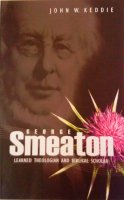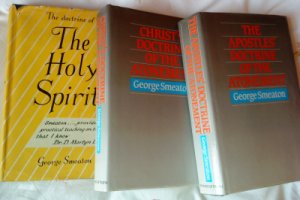John Keddie has recently (2007) produced an extremely useful biography of George Smeaton, one of the many outstanding theologians of the 19th century Scottish church.
biography of George Smeaton, one of the many outstanding theologians of the 19th century Scottish church.
Smeaton (1814-1889) studied at Edinburgh University and was part of the group of friends which included McCheyne, the Bonars, and Henry Moncrieff. He was ordained in 1839 and inducted to the new quoad sacra charge in Morningside (the building on the corner of Morningside Road and Newbattle Terrace, now belonging to Napier University (Google Street View here if the link works)). He came out of the compromised Establishment at the Disruption and pastored a charge in Perthshire for about 10 years before being appointed professor of New Testament exegesis at the second Free Church College in Aberdeen. Just a few years later the Assembly voted to appoint him to the chair of exegetical theology at New College in Edinburgh, where his colleagues included William Cunningham, James Bannerman, James Buchanan, and John ‘Rabbi’ Duncan. He continued there as professor from 1857 till his death in 1889. He was thoroughly well versed in Greek and Hebrew and various other languages, kept fully in touch with the literature in his field, including what was produced on the Continent, and had a grasp of historical theology which almost, it was whispered, rivalled that of William Cunningham himself.
Keddie suggests two reasons for why Smeaton is so little known today, relative both to his huge theological influence in his own time and to many of his contemporaries who are much more readily recognised – think Robert Murray McCheyne, the Bonars, Rabbi Duncan, James Begg. (This biography is indeed largely original material, as no full-length account of Smeaton’s life and contribution has been produced until now.) The more practical reason for why Smeaton is less well known is his relative lack of prominence in the ecclesiastical scene. Huge battles were fought in the church courts of the time, but although Keddie thoughtfully outlines Smeaton’s position on these issues, he explains that Smeaton’s contributions at presbytery and assembly level were rather few.
His second reason is more depressing: “in the nineteenth century, generally speaking, the rising generation of divinity students became impatient with the old orthodoxy. The old orthodoxy wasn’t exciting enough …” It’s fascinating, and alarming, to see exactly how rapidly the apparently staunch bulwarks of orthodoxy crumbled in the post-Disruption Free Church (at least among the men in places of influence – Marcus Dods, AB Davidson, the outrageous William Robertson Smith – who staffed the colleges as Smeaton and Duncan’s successors and massively undermined virtually every distinctive that had marked the Free Church at the Disruption). It wasn’t, incidentally, that the ‘rising generation’ had engaged with the ‘old’ orthodoxy and refuted it in any meaningful way. The strategy was rather to simply adopt the fashionable positions of speculative thinkers elsewhere and write off the concerns of the orthodox as empty expostulations, the relics of a bygone over-rigid era, unable to meet the expectations and needs of contemporary society. (The parallels with today’s religious scene are achingly obvious.) In fact Robertson Smith et al fancied themselves to be faithful to the confession, even though they went far beyond an uncomfortable ‘arminianising of the calvinism of the confession’, which again arguably dogs the Reformed scene today, to positions which are recognised as liberal even now although they might not strike us as being as extravagant as they seemed at the time.
In a series of short, informative chapters Keddie presents the various stages of Smeaton’s life and his views on the various controversies of the day, before concluding with a couple of chapters which look at Smeaton’s work on the person and work of the Holy Spirit and the atonement. Smeaton’s publications on these  doctrines are what he is best remembered for today; on the front of the gaudy yellow cover of the Banner of Truth’s 1958 reprint of The Doctrine of the Holy Spirit is an endorsement by Dr Martyn Lloyd-Jones – Smeaton “provides the best practical teaching on this subject that I know.”
doctrines are what he is best remembered for today; on the front of the gaudy yellow cover of the Banner of Truth’s 1958 reprint of The Doctrine of the Holy Spirit is an endorsement by Dr Martyn Lloyd-Jones – Smeaton “provides the best practical teaching on this subject that I know.”
(These are the only three works of Smeaton’s that I’ve read. They are all profound, reverent, and orthodox. They are also most painstakingly exegetical. The works on the atonement in particular could almost serve as commentaries on the various passages he deals with. He provides most extensive surveys of the biblical evidence available and thoroughly explores them with a view to establishing their meaning, with expert reference to the original languages, and in their contribution to, and connection with, the overall gospel scheme, as that is understood in the rich federal theology which he and his colleagues were so steeped in.)
Keddie draws from the comments of Smeaton’s contemporaries to give a picture of the man as a well-loved pastor, an outstanding scholar, and a good and gentle Christian.
“His preaching set forth the great evangelical doctrines with unction and power.”
“Not only had he the ordinary acquirements of a teacher of exegesis, exact scholarship and acquaintance with modern criticism, but he had a quite exceptional theological learning” (according to Marcus Dods, strangely enough); “I do not know if any man is left among us who is so much at home as he was in the patristic and mediaeval writers.”
“Dr Smeaton was a man of singular sweet, sympathetic and guileless nature – a man greatly beloved for his goodness, and respected for his thorough consistency and blameless integrity. Above all, he was distinguished for his genuine piety and purity of heart, and for following after peace with all men, and personal holiness.”
In producing this succinct, comprehensive and accessible account of Smeaton’s life, Mr Keddie is making the man and his theology available to the contemporary church for general edification. Smeaton, and the doctrine and religion that Smeaton embraced and lived, have been undeservedly underlooked – this new account of how appropriate and admirable it is for consistently orthodox thinking to go hand in hand with thoroughly Christian living is a reminder not only of how drastically the church in Scotland has abandoned her brighter past (since it’s not always helpful to inquire why the former days were better than these) but should also be a spur to strive for the same holiness and intelligent loyalty to the truth as Smeaton’s life exemplifies.
- John W Keddie, George Smeaton: Learned Theologian and Biblical Scholar. Evangelical Press, 2007. Available here.

Pingback: Treading Grain » Post Topic » In Christ Alone: Living The Gospel Centered Life
Thank you for this excellent post on Smeaton! His Apostles Doctrine of the Atonement was much used of God in my life. His patient, methodical approach to the subject worked on me in a way difficult to describe, but for which I am very grateful. Perhaps it was the utter lack of speculation — I don’t know. In any event, mat God raise up more like him.
LikeLike
Yes – i think it’s at the end of the Apostles Doctrine that he has that overview of the development of the doctrine of the atonement, which i found absolutely enthralling, strange perhaps to say! The Apostles’ Doctrine is an easier read than Christ’s Doctrine, although they’re both organised along the same lines. I’ve only read a couple of his books, although I know they deserve more to be studied than just read, but he’s so profound, and thorough, and thoroughly biblical.
LikeLike
My brother, Robert W.Smeaton has been on a quest to find out more about George Smeaton. Thank you for helping him fill in the gap. Thank you.
LikeLike
I shall share with you my brother, Robert William Smeaton’s opinion that I received by email today about Reverand George Smeaton.
I shall quote him “My response to reading Reverand Dr.George Smeaton’s religious works,it is his opinion “that his soulful grasp of “the Father , Son and Holy Ghost” reach far beyond any pastor’s communication legacy.”
I’d like to thank all of you for sharing my brother’s quest.
LikeLike
Thanks for commenting, Renee! May I ask if George Smeaton was a relation of yours?
If you’re interested in finding out about Rev G in detail, this biog by John Keddie would certainly be worth a look – he provides references to the various notices and obituaries that were written at the time as well, which would also be interesting to follow up.
I don’t have the book to hand any more but from memory I think a cousin or ?uncle of George’s (possibly his name was Alexander?) was involved in building a famous lighthouse whose name escapes me for the moment – a high achieving family it would seem!
LikeLike
Hello.
I am a relative of Dr George Smeaton. He is my great great grandfather on my fathers side. His son William is my great grandfather.
David Davidson
LikeLike
Hello David! It’s really interesting to hear from you. I’m a big fan of George Smeaton. Are you living in Scotland?
LikeLike
Yes. Still reside in Scotland. Did Renee Smeaton Burgess confirm if she was a relative of George Smeaton?
David
LikeLike
I haven’t had any further contact with Renee Smeaton Burgess I’m afraid David.
LikeLike
The quotable Smeaton:
http://against-heresies.blogspot.com/2009/10/loved-as-son-condemned-as-sin-bearer.html
http://ninetysixandten.blogspot.com/2006/06/smeaton-quotes-macdonald.html
LikeLike
Dear Sir/Madam,
Where canI buy J.W.Keddie: Smeaton?
Thank you for your information!
With kind regards, rev.M.D.Geuze, Nunspeet. The Netherlands
LikeLike
Dear Rev. M.D. Geuze.
Iam James Karanja your student at Plateau Bible School in Kenya. Can we exchange letters?
LikeLike
Hello,
it was published by Evangelical Press, but I see that they currently say “out of stock”. So maybe try Amazon? Is there a Dutch version of Amazon? The uk one is here – http://www.amazon.co.uk/George-Smeaton-Victorian-Theologian-Testament/dp/0852346360/ref=sr_1_1?ie=UTF8&s=books&qid=1282216987&sr=8-1
Alternatively I suppose it might be worth asking Charles Douglas in the Free Church Bookshop or Norman Fraser in the Free Presbyterian Bookroom
http://www.freechurch.org/index.php/scotland/bookshop/
https://www.fpbookroom.org/acatalog/About_Us.html
LikeLike
I have been reading Rev. Smeaton’s book, The Doctrine of Atonement as Taught by Jesus Christ (that is close) It is excellent. It made me get up and search to see just who Smeaton was. :-)
I got the book from http://www.archive.org. You can get it free as a streaming download. I got it in the .pdf format. You might check Archive and see if any of his other titles are available. I will bet that they are.
Larry Ball
LikeLike
Interesting. Thanks. Here are:
* Apostles’ Doctrine of the Atonement – http://www.archive.org/details/doctrineofatonem00smea
* Christ’s Doctrine of the Atonement – http://www.archive.org/details/docofatone00smeauoft
* The Doctrine of the Holy Spirit – http://www.archive.org/details/thedoctrineofthe00smeauoft
The Apostles’ Doctrine is described as being scanned from the library of BB Warfield and you can see on the title page it’s inscribed “Benj. B Warfield 1874”. How cool is that.
LikeLike
Pingback: The Andrew Fuller Center » A reflection on a quote by George Smeaton
Pingback: whose story | ninetysix and ten
Pingback: George Smeaton and Logos Bible Software | The Old Guys
George Smeaton’s books are my most preciuos pocession on earth. As the Atonement is Christ’s work for us and as his books (both “Christ’s doctrine” and “the Apostle’s doctrine” are the ultimate exposition on the subject I credit them with the illumonation of the spirit with a tremendous geounding in and actually assurance in my Faith.
LikeLike
That’s wonderful to hear. Smeaton had a similar impact on my life. Reading “The Apostles’ Doctrine of the Atonement” was a watershed experience for me.
LikeLike